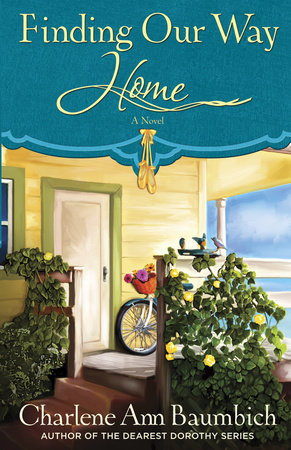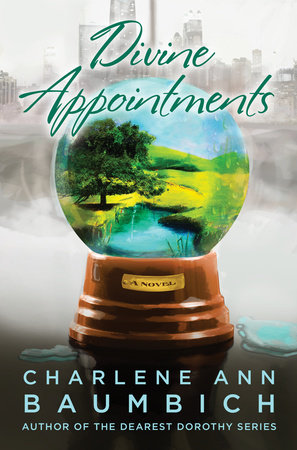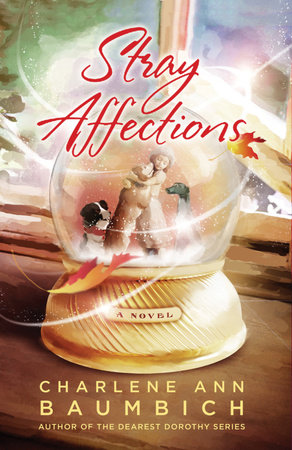Excerpt
Finding Our Way Home
Sasha readjusted the multicolored shawl until it was high and tight around her neck. As she secured it in place with her palm, the tip of her long, slim index finger landed on one of the dozens of glass pearlescent beads hand-worked into the elegant crocheted garment, complete with satin trim. She repeatedly tapped the bead with her fingernail. The sound, very close to her ear, reminded her of the familiar tick of a metronome.
No, it sounds more like the ticking of clock, counting down to death by regret.
She shook her head to dismiss the dark thought and stared at the snowglobe on her side table, on which she set her ever-present cup of hot tea. It didn’t matter if the outdoor temperature was twenty-five or ninety-five: “Hot tea, please. That will do.” On this midsummer Saturday in Wanonishaw, Minnesota, even though it was a humid eighty-seven degrees outdoors, Sasha did not turn on the air conditioning, and still she felt a slight chill.
Pinning her eyes on the ballerina in the snowglobe, she slowly rolled the bead between her thumb and index finger, as if fine-tuning a memory on a radio dial. She rocked back and forth in the rocking chair, the only chair in the house that, for the most part, didn’t hurt her back. She nearly lived in it since she’d moved back in. It had been her mom’s favorite chair, the one she used to rock in while nursing Sasha.
Her mom loved to tell the story about how Sasha often fell asleep while she fed her, how she had to tap the arch of her tiny bare foot to wake her. Sasha could hear her mother’s gravelly voice, see the spark in her Paul Newman–blue eyes. “You were such a tiny little bird, yet from the get-go, you were so uncommonly strong.”
On the rare occasions Sasha visited home, her mother always proudly showed her the most recent clippings and photos she’d added to the latest scrapbook. She had started the scrapbooks when Sasha was a child, the program from her first dance recital leading the way. Across the top of one of the pages of that first scrapbook, in her loopy handwriting, her mother had written, “‘I could twirl forever!’ The first words out of Sasha’s mouth this morning.”
Quickly the scrapbooks began to document the life of an emerging professional ballerina. “Seems impossible,” Sasha’s mother would say, “that such a tiny little bird could grow into such a majestic swan.” She’d point to the recent pictures and the lean muscles in Sasha’s calves, marvel at her balance, revel in her glorious costumes and topflight billing.
As the sound of her mother’s voice faded away, the rhythm of Sasha’s rocking and the roll of the bead between her fingers began to fuse with the arpeggio of orchestra music rising within her. She closed her eyes, rested the back of her head against the support pillow, and envisioned the ballerina in the snowglobe—elegant neck extended, feet in perfect fifth position—suddenly lengthen her ankles and elevate to pointe. The dancer, a perpetual and wonderful smile on her face, floated her arms to shoulder height. She tilted her delicate head and demure eyes toward the floor, slightly stage left. At the swell of the vibrating string section, in one velvet-smooth motion, the dancer lifted her chin, elongated her neck, raised her chest upward, and leaned toward the audience as she extended her right leg high up behind her and reached her left arm forward. Only her agility, strength, and the tip of her pointe shoe on her arched left foot anchored her to the floor as she performed a stunning penché arabesque.
The dancer was acutely aware that the stage lights brought to life the sparkles sewn into her pink, three-quarter-length tutu, flared like an elegant fan between her legs. She rejoiced in knowing she looked as stunning as Maria Tallchief, the prima ballerina in the picture she had, as a child, tacked to her bedroom wall, right above the ballerina snowglobe she kept on her bookcase headboard.
With perfect timing, Sasha’s partner’s large, warm hands surrounded her waist as he lifted her like a plume readied to fill the air with poetic movement and words. Her spirit and body sailed with the rising crescendos and quieting lulls of the melody as together she and Donald soared across the stage, his strength repeatedly lifting and lowering her, the box of her pink satin pointe shoe barely tapping the floor, her tutu flaring during each quick descent of their grand pas de deux, and…
CRASH!
With a lightning fast series of tumultuous thuds, Sasha and her partner fell to the floor. Disoriented, Sasha darted her eyes from here to there to lock in her bearings. Excruciating pain riveted her tailbone, hip, and leg. Please, God, don’t let either of us be injured! We have three more stops this tour!
It wasn’t until her vision focused on a pair of young hands picking up china shards and the dish towel soaking up a spreading circle of tea that reality sank in, yet again. She was no longer Sasha Davis, glitterati, principal dancer at Mid-Central Festival Ballet in Boston, one of the largest and most prestigious ballet companies in the United States. She was no longer traveling the world, performing to standing ovations. She was simply Sasha Davis. A near invalid living in her deceased mother’s home, the home she grew up in, with shelves full of scrapbooks in an upstairs bedroom she could neither get to nor stand to look at.
She was back in Wanonishaw, Minnesota, a town—a life—she’d left when, at age seventeen, she’d been accepted into Juilliard.
She put her hands on the arms of the rocker and leaned forward. The shawl slid down behind her back. “I’m sorry,” she said to the top of Evelyn’s head. Evelyn, nineteen, was on her knees, cleaning up the mess. “I can’t believe I spilled again. How many teacups have I gone through in the two months since you’ve been with me?”
Evelyn looked up and chuckled. Beads of perspiration dotted her forehead, dripped off her nose. “Your share of them,” she said. She carefully set pieces of china in the metal garbage can she’d brought from the kitchen. “But no worries, Ms. Davis. Your mom had so many teacups and saucers in this house, you could break one a day, live to be a hundred and fifty, and still not run out! I haven’t seen so many cups and saucers since the last time I went to the cities and dreamed about setting up my bridal registry at Macy’s. I bet there isn’t a china department in any store in the whole world that has as many unique teacups as your mom!” Evelyn swiped at the remaining puddle of tea with the towel, which she wrung out in the garbage can. She dabbed at a few drops splattered on the fringe of the nearby area rug.
Sasha noticed the way Evelyn managed, at regular intervals throughout the day, to maneuver her hand in order to catch another glimpse of her own engagement ring. At least that’s what Evelyn had called it when she jutted her finger in front of Sasha’s face during her interview for this dreadful job. “My engagement ring from my fiancé,” she said dreamily, as if the diamond could rival one of Elizabeth Taylor’s. If there was even a chip of genuine diamond in the middle of that thin band, Sasha would be surprised.
“I’ll bring you another cup of tea,” Evelyn said, startling Sasha as she sprang to her feet and headed toward the kitchen. “The water’s still hot in the kettle,” she said over her shoulder. “Sit tight for a minute.”
Sit tight? After exhausting herself simply pulling the shawl from behind her, wrestling it over her shoulders, and tucking it up under her neck, Sasha slumped back in the chair. Who would have imagined that at only age thirty-seven, that’s nearly all I’d be able to do? I might as well be ninety.
Through the window, a large bird caught Sasha’s eye as he floated onto the porch rail. His blue iridescent head and bright eyes glistened in the sun. The colors, including his jet-black body, reminded her of one of the dramatic costumes she’d worn during a solo performance in Venice. Organza, chiffon, tulle, beads, the music… She fingered a bit of the satin that trimmed her shawl, recalled the exact tiara she wore for the sequence.
The bird took a few hops, then began to bathe in the warped aluminum frying pan she’d instructed Evelyn to get rid of after the dramatic incident just days after Evelyn moved in. The next morning, when Evelyn drew the drapes, Sasha saw the old pan, its handle half-melted, on the porch railing. It was filled with water and a handful of glass marbles. She opened her mouth to chastise Evelyn for once again not following her instructions, but before she could emit a sound, a bright small bird, its head the color of coral, landed on the handle, hopped to the rim of the pan, and took several delicate drinks of water. As soon as he was gone, a small, brilliant, gold, black, and white bird took his place and broke out in song. Such beauty. So many colors.
Such tiny little birds.
When she looked up, Evelyn was smiling, nodding her head in that annoyingly knowing way of hers.
Ever since the pan first appeared on the rail, a constant parade of birds drank and bathed, splashed and vied for space. The expensive birdbath Sasha sent her mother one Mother’s Day—a departure from the usual teacup and saucer—sat empty in the middle of the yard. Utterly entertaining, these tiny dancing birds. And now, a large yellow-eyed one, swooping in like the handsome Prince Siegfried in Swan Lake. A few bars of Tchaikovsky’s glorious score played in Sasha’s head, then quickly faded. By the time the grackle, which Evelyn had identified for her, was done with its raucous bath, the pan was nearly splashed empty.
Just like my life.
“Time to refill the pan again,” Evelyn said, as she settled a new teacup and saucer into their usual spot. “Funny how much the birds love that old thing. Wonder why? Maybe the sun warms the metal, which warms the water.”
“Maybe,” Sasha said, careful to sound like she didn’t care, which she didn’t.
“Or maybe it’s the marbles. I read birds are attracted to shiny glass, which is why I put the marbles in there.”
“Maybe.” Sasha frowned, shook her head, pursed her lips. “Perhaps I should have someone create a cement birdbath decorated with all the shards of glass I’ve produced lately.”
“Just to remind you, Ms. Davis,” Evelyn said, positioning herself right in front of Sasha, encroaching on her personal space by nearly standing on her toes, “you won’t be in that rocking chair forever, you know. Allowing yourself to get all pity-partied up just saps the energy your body needs to mend itself.”
Sasha studied the large, big-boned young woman standing before her, who, hands on her hips, boldly studied her right back.
Sasha’s chin jutted slightly upward as she felt her anger rise. “Who do you think you are?”
Evelyn backed up a step.
“Not only my aide, but a mind reader too? My cheerleading squad? My shrink? May I remind you that I pay you to assist me. To do what I instruct,” Sasha said, her eyes momentarily diverting to the frying pan she’d instructed Evelyn to get rid of. “I do not pay you— and I pay you well—to lecture me or to override my decisions.”
Evelyn straightened, letting her hands fall to her sides. “Yes, Ms. Davis, you do pay me well, and I thank you. I’m sorry if I overstepped my boundaries. I’ll try to do better next time. It’s just that I hate to see you get so down on yourself.” She bit her lip. “If there’s nothing else you need”—Evelyn paused, waited until Sasha shook her head—“I have some errands to run. Maybe you can enjoy a nap while I’m gone.”
This wasn’t the first time Evelyn had reminded Sasha that she was cranky when she was tired. At least this time she was more subtle about it.
“I’ll be back around four-thirty to prepare dinner. And again, I’m sorry. My mom’s often told me I have a short circuit when it comes to boundaries.” Evelyn reached back, grabbed her long blond ponytail, and twirled it around her index finger. “But my fiancé says he adores my spunky attitude. I guess I have to figure out a happy medium, or where to be what or who or how. Or something like that.” She shrugged and grinned. “Sure you don’t need anything before I go?”
Sasha shook her head and flicked her fingers in dismissal. Shortly after she heard the back door close, she saw Evelyn whizzing down the street on her bicycle. Her pink Life is good–brand backpack clung tightly to her body. Her ponytail sailed behind her like a kite tail. Isn’t everyone supposed to wear a helmet?
But what was the point of playing safe in life? Look where it had gotten Sasha. All those years. All that practice. All that pain.
As much as that girl annoys me, why is it she’s right about nearly everything? Pity party, indeed. Knock it off !
Sasha sucked in her stomach and tried to flatten her back to the chair. Although the action caused her to grimace, she straightened her right leg and lifted it parallel to the floor. She pointed her toe, rotated her foot to the left, then to the right. She pointed her toe again, studied the line of her slim leg beneath her long rayon skirt, thought about all the times she’d stood at the barre while studying the stretch of her legs in the mirror, the angle of her arms, the tilt of her head and carriage. She shook her head, closed her eyes, and repeated the exercise with her left leg. She sucked in her breath and tried to will herself to lift both legs at once, an action that hurt so badly it made her whimper.
After five months, her body still wasn’t ready for that much rigor. The doctor told her to let the pain be her guide, not to rush the process lest she risk setting back her healing. Absolutely no pushing herself until physical therapy began. But how could she sit there and do nothing? The life of a dancer was fraught with aches and pains, twitches and bruises. One learned to bandage up, ice down, and gut it out. Doing nothing wasn’t acceptable!
Then a sickening thought struck her. Pain wasn’t a guide. Pain had become her best friend. At this point in her messed-up life, without the pain, she would have nothing. Nothing at all.
She squeezed the chair arms, pushed her spine into the back cushion, and tried to lift both legs. Again and again and again she tried, until at last she broke into sobs, not an ounce of strength left in her body.






